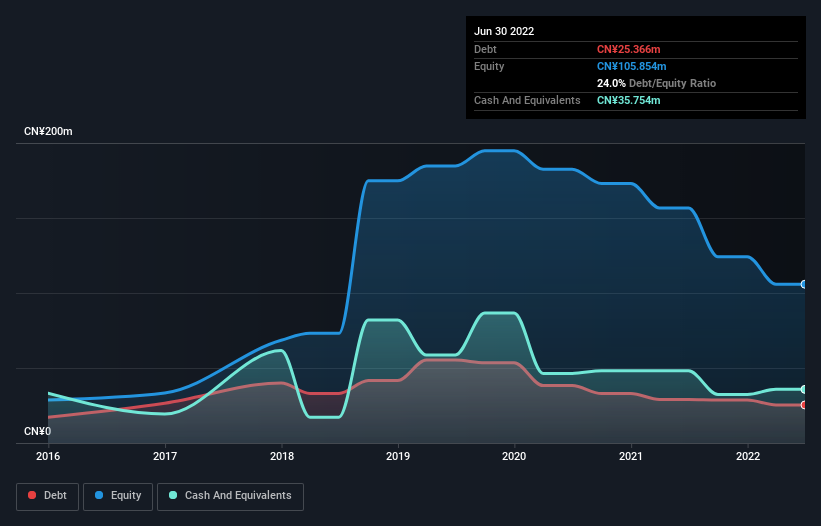The external fund manager backed by Berkshire Hathaway's Charlie Munger, Li Lu, makes no bones about it when he says 'The biggest investment risk is not the volatility of prices, but whether you will suffer a permanent loss of capital.' So it might be obvious that you need to consider debt, when you think about how risky any given stock is, because too much debt can sink a company. We can see that Miji International Holdings Limited (HKG:1715) does use debt in its business. But the real question is whether this debt is making the company risky.
Why Does Debt Bring Risk?
Debt is a tool to help businesses grow, but if a business is incapable of paying off its lenders, then it exists at their mercy. Ultimately, if the company can't fulfill its legal obligations to repay debt, shareholders could walk away with nothing. While that is not too common, we often do see indebted companies permanently diluting shareholders because lenders force them to raise capital at a distressed price. Of course, plenty of companies use debt to fund growth, without any negative consequences. When we think about a company's use of debt, we first look at cash and debt together.
View our latest analysis for Miji International Holdings
What Is Miji International Holdings's Debt?
The image below, which you can click on for greater detail, shows that Miji International Holdings had debt of CN¥25.4m at the end of June 2022, a reduction from CN¥29.0m over a year. But it also has CN¥35.8m in cash to offset that, meaning it has CN¥10.4m net cash.

How Strong Is Miji International Holdings' Balance Sheet?
Zooming in on the latest balance sheet data, we can see that Miji International Holdings had liabilities of CN¥52.7m due within 12 months and liabilities of CN¥5.23m due beyond that. On the other hand, it had cash of CN¥35.8m and CN¥38.6m worth of receivables due within a year. So it can boast CN¥16.4m more liquid assets than total liabilities.
This surplus suggests that Miji International Holdings has a conservative balance sheet, and could probably eliminate its debt without much difficulty. Succinctly put, Miji International Holdings boasts net cash, so it's fair to say it does not have a heavy debt load! When analysing debt levels, the balance sheet is the obvious place to start. But it is Miji International Holdings's earnings that will influence how the balance sheet holds up in the future. So if you're keen to discover more about its earnings, it might be worth checking out this graph of its long term earnings trend.
Over 12 months, Miji International Holdings made a loss at the EBIT level, and saw its revenue drop to CN¥119m, which is a fall of 26%. That makes us nervous, to say the least.
So How Risky Is Miji International Holdings?
Statistically speaking companies that lose money are riskier than those that make money. And the fact is that over the last twelve months Miji International Holdings lost money at the earnings before interest and tax (EBIT) line. And over the same period it saw negative free cash outflow of CN¥25m and booked a CN¥46m accounting loss. With only CN¥10.4m on the balance sheet, it would appear that its going to need to raise capital again soon. Even though its balance sheet seems sufficiently liquid, debt always makes us a little nervous if a company doesn't produce free cash flow regularly. When analysing debt levels, the balance sheet is the obvious place to start. However, not all investment risk resides within the balance sheet - far from it. To that end, you should learn about the 3 warning signs we've spotted with Miji International Holdings (including 2 which are concerning) .
If you're interested in investing in businesses that can grow profits without the burden of debt, then check out this free list of growing businesses that have net cash on the balance sheet.
New: Manage All Your Stock Portfolios in One Place
We've created the ultimate portfolio companion for stock investors, and it's free.
• Connect an unlimited number of Portfolios and see your total in one currency
• Be alerted to new Warning Signs or Risks via email or mobile
• Track the Fair Value of your stocks
Have feedback on this article? Concerned about the content? Get in touch with us directly. Alternatively, email editorial-team (at) simplywallst.com.
This article by Simply Wall St is general in nature. We provide commentary based on historical data and analyst forecasts only using an unbiased methodology and our articles are not intended to be financial advice. It does not constitute a recommendation to buy or sell any stock, and does not take account of your objectives, or your financial situation. We aim to bring you long-term focused analysis driven by fundamental data. Note that our analysis may not factor in the latest price-sensitive company announcements or qualitative material. Simply Wall St has no position in any stocks mentioned.
About SEHK:1715
AI Health Technology
An investment holding company, engages in the research and development, manufacturing, and trading of kitchen appliances primarily in the People’s Republic of China.
Excellent balance sheet with slight risk.
Market Insights
Community Narratives



